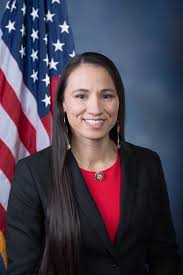Landmark project to create thousands of jobs; Davids, Moore, colleagues push to restore report on MMIP Crisis

DE SOTO, KS — Representative Sharice Davids joined local leaders, business executives, and community members to celebrate the official grand opening of the Panasonic EV battery manufacturing facility in De Soto. The project, which Davids has supported since its earliest stages, is expected to bring 4,000 direct jobs and thousands more indirect jobs to the region, while helping to secure America’s supply chains and grow the Kansas economy.
“This is a transformational moment for De Soto, Johnson County, and our entire state,” said Davids. “From the beginning, I’ve worked across the aisle and across levels of government to support this project — not just because of the jobs and economic growth it brings, but because of what it represents: Kansas leading the way in American manufacturing, clean energy innovation, and long-term economic opportunity.”
Davids has played a key role in preparing the region for the Panasonic facility. She helped secure federal investments for key infrastructure upgrades, including improvements to 103rd Street and other regional roads around the new facility. She also brought former U.S. Transportation Secretary Pete Buttigieg to De Soto to see firsthand how the bipartisan infrastructure law is being put to work supporting the region’s growth.
In addition to advocating for strong local partnerships and workforce development pipelines, Davids has continued to spotlight the need for responsible, community-focused growth. She has hosted roundtables with local officials, education leaders, and small businesses to ensure the benefits of the Panasonic facility reach all corners of the region.
The De Soto facility is Panasonic’s largest EV battery manufacturing site in the United States and one of the largest economic development projects in Kansas history. Production is expected to ramp up in the coming months, with significant hiring and training efforts already underway.
Representative Sharice Davids (KS-03) and Gwen Moore (WI-04) led their colleagues in calling for the Department of Justice (DOJ) to restore the Not Invisible Act Commission Report to their website. This report included critical information on the Missing and Murdered Indigenous Person (MMIP) crisis but was abruptly removed due to an executive order, erasing years of needed research.
In the letter, the Members highlight the important insights in the report, writing, “The Not Invisible Act Commission was composed of Tribal leaders, law enforcement, federal partners, service providers, and survivors who made recommendations to the DOJ and DOI on combating violence against American Indians and Alaskan Natives. The Commission held seven in-person field hearings and one multi-day virtual national hearing to hear from over 260 people. Many people who spoke to the Commission were family members of lost loved ones or themselves victimized by violence. Their stories and insights were essential to the report’s final recommendations and provided critical insight into addressing the MMIP crisis. This landmark report was a culmination of months of due diligence collection of testimony and data from across the country.”
“This legislation took a critical step in establishing how the government can continue to address the longstanding and ongoing MMIP crisis through the comprehensive collection of information and reporting on a federal agency level. However, on February 18th, 2025, the 212-page report titled, Not One More, was removed from the DOJ website. We understand that this was done to comply with President Trump’s Executive Order entitled Defending Women from Gender Ideology Extremism and Restoring Biological Truth to the Federal Government (Defending Women). However, the work done by the Not Invisible Act Commission explicitly does not promote gender ideology or extremism and is compliant with sections d and f of the OPM memo on this matter.”
In the letter the Members emphasize the importance of this report given that Indigenous people, especially Indigenous women, face higher rates of violence yet these incidences are underreported.
“Indigenous people face disproportionate rates of violence. According to DOJ’s National Institute of Justice, 84.3 percent of women and 81.6 percent of men have experienced violence in their lifetime.1 At the same time, lack of data due to racial misclassification and adverse relationships between tribal government and outside law enforcement have led to an un-reporting of MMIP cases.”
The Members call for action, writing “We ask that the DOJ take immediate steps to restore the Not Invisible Act Commission Report as removing the data from public government websites obstructs long-overdue justice and harms any efforts to combat the crisis.”
The Members continue, “Accessible data is essential to addressing this crisis as it identifies patterns of disappearances and death, supports law enforcement and community responses, and informs public policy decision-making. The final report’s removal strips our most powerful tool in the pursuit of justice.”
Read the full text of the letter here.
SUBSCRIBE ONLINE TO GET THE HUTCHINSON CITIZEN JOURNAL IN YOUR INBOX - FREE!
Sponsors (click me!)


